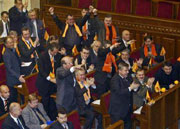European missionaries to save Ukraine from political disaster
The battlefield of the Ukrainian poll crisis has moved to the parliament

One could give the following description to the center of the political opposition in Ukraine: polls – Independence Square – Supreme Court – the parliament. The court ruled to hold a run-off election on December 26th. A lot of things depend on the Ukrainian parliament now: the opposition is trying to strengthen its victory there, while the authorities are attempting to gain revenge. 
When the Supreme Court announced its decision to hold the repeated voting, it seemed to everyone that the opposition's victory was obvious. Both President Kuchma and governmental candidate Yanukovych took a break and withheld all comments. Leonid Kuchma, however, repeatedly stated before that a run-off election would be absolutely unacceptable to overcome the political crisis. The court's decision will make Ukraine the first country in the world, in which the presidential election consisted of three voting rounds. Leonid Kuchma agreed upon the decision of the Supreme Court, although he was definitely not happy about it – one could hear it in his voice. Viktor Yanukovych did not have any objections either and expressed his readiness to participate in the revote.
One may presume that the Ukrainian authorities are expecting the Supreme Court to bring down the verdict about Viktor Yushchenko's final victory. The battlefield of the Ukrainian poll crisis has moved to the parliament, where deputies are trying to determine the fate of the political reform. The decision regarding the reform was made last week, when the feuding parties and foreign mediators agreed upon the decision to run a political reform in Ukraine to grant more powers to the prime minister and the parliament (depriving the president of such powers). The parliament considered the issue during the past weekend.
In addition to the law about the political reform, the deputies had to pass the reelection law. The current law of Ukraine does not contain anything about the procedure that is why the re-voting process of December 26th may be considered illegitimate. It turned out, however, that Yushchenko's followers were ready to pass the reelection law alone. The opposition is sure of Yushchenko's victory on December 26h – that is why it was decided to save the political reform issue for later. Pro-governmental factions, communists and socialists insisted on passing both of the draft laws. Alexander Moroz, the leader of the Socialist Party of Ukraine, backed Viktor Yushchenko prior to the second voting round only on the assumption of running the political reform as soon as possible. Moroz has become an important figure in the crisis now: if the opposition breaks up with socialists, Yushchenko's chances for victory will reduce considerably.
The Ukrainian opposition finds itself in a quite difficult situation. On the one hand, the opposition is in dire need of the reelection law. On the other hand, they do not really need a political reform and a “decorative” president. Yet, Yushchenko's followers do not know how to win deputies' support to have only one law of the two approved. Some of them have already described the evens in the Ukrainian parliament as the “crawling counterrevolution.”
The Supreme Rada, the parliament of Ukraine, will gather for its next session on December 14th, although an earlier date is also possible. Round table discussions will also continue, as it was promised before. Lithuanian President Valdas Adamkus stated last week that the negotiations in Kiev, in which he participated, were the hardest talks in his career. Adamkus's Polish colleague, President Aleksander Kwasniewski, was more optimistic about his impressions. Prior to his visit to Ukraine, Kwasniewski told reporters that he was going there with a “good offices mission.” Ukraine has not suffered from the lack of missionaries for the recent 1.5 months indeed.
Subscribe to Pravda.Ru Telegram channel, Facebook, RSS!




